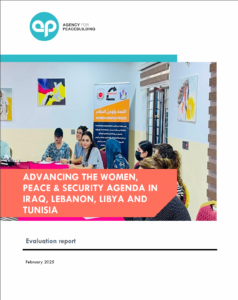Learning from efforts to advance the Women, Peace and Security Agenda in Iraq, Lebanon, Libya and Tunisia
This report presents the findings of the final evaluation of the efforts that Un Ponte Per (UPP) and its network of partners–all of them civil society organizations (CSOs) based in Iraq, Italy, Lebanon, Libya or Tunisia–implemented to contribute to the advancement of the Women, Peace and Security (WPS) Agenda in the Middle East and North Africa (MENA) region, from 2021 to early 2024.
OBJECTIVES
The goal of the evaluation was to identify lessons learned to inform future efforts by UPP and all project partners to support women participation and empowerment on peace and security in the five target countries (Iraq, Italy, Lebanon, Libya and Tunisia).
EXPERTS
Bernardo Monzani
PARTNERS
- Un Ponte Per (Italy)
- Fighters for Peace (Lebanon)
- Permanent Peace Movement (Lebanon)
- Women International League for Peace and Freedom (Lebanese chapter)
- Yazidi Women Empowerment Organization (Iraq)
- Youth Bridge Development Organization (Iraq)
- Association Lina Ben Mhenni (Tunisia)
- Libyan Legal Aid Organization (Libya)
- Centro Studi Difesa Civile APS (Italy)
Background
AP partnered with UnPonte Per (UPP) to identify lessons learned from the organization’s efforts to advance the Women, Peace and Security (WPS) Agenda in Iraq, Lebanon, Libya and Tunisia.
The evaluation was designed and implemented under the “Women’s Action for Peace” (WAP) project, which aimed to support an informal, transnational network of civil society organization (CSOs) working on the WPS Agenda, so that they could continue strengthening their skills and knowledge for peacebuilding and advocacy, supporting awareness raising around the Agenda in their respective communities, and successfully engaging policy- and decision-makers.
UPP led these efforts, working with partners in all the target countries. These included: Fighters for Peace (FFP), Permanent Peace Movement (PPM) and the national chapter of the Women International League for Peace and Freedom (WILPF) in Lebanon; the Yazidi Women Empowerment Organization (DAK) and the Youth Bridge Development Organization (YBDO) in Iraq; Association Lina Ben Mhenni in Tunisia; the Libyan Legal Aid Organization (LLAO) in Libya; and Centro Studi Difesa Civile APS in Italy.
This represented a key learning activity, meant to support a reflection on what worked in the implementation of previous projects on the same theme—and what did not—and to make recommendations to shape ongoing and future efforts by UPP and all of its partners.
Results
The evaluation identified a number of lessons learned, which should be carried into future efforts:
- Internal governance mechanisms are important for the network to be effective, even if it wants to be informal.
- The intergenerational element of several activities amplifies impact, transferring knowledge and creating motivation.
- Common priorities should be set and clearly stated by network members, to facilitate engagement both within approved projects, and between them.
- National Actions Plans are good entry points for advocacy, but also tools with important limitations.
- Beware of the rush dictated by a tight implementation schedule, which can create frustration among network members.
Overall, the efforts of UPP and its partners were extremely relevant for the challenges CSOs face in trying to influence the extent to which, and how, the WPS Agenda is implemented in their own countries. The informal, transnational network established by partners was also an effective vehicle for creating much-needed exchanges and the transfer of skills and knowledge from organizations that had already been working on the WPS Agenda for years, and organizations that were new to it. This feature was critical not only for achieving some of the projects’ most positive results, but also for engendering a very positive, virtuous dynamic, which effectively motivated experts and novices alike.

































